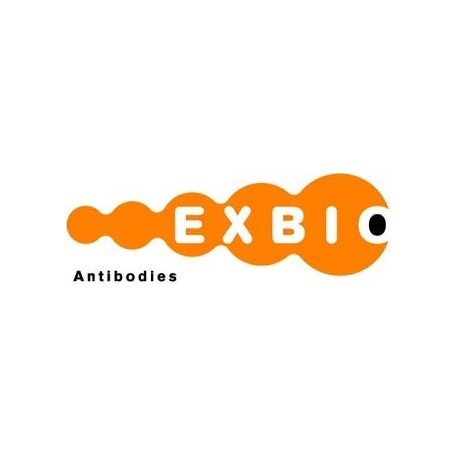Cart 0 Product Products (empty)
No products
To be determined Shipping
0,00 € Total
Prices are tax excluded
Product successfully added to your shopping cart
Quantity
Total
There are 0 items in your cart. There is 1 item in your cart.
Total products (tax excl.)
Total shipping (tax excl.) To be determined
Total (tax excl.)
Data sheet of Mouse Monoclonal to Cyclin D1
| Brand | Exbio |
| Product type | Primary antibodies |
| Reactivity | Human, Non-Human Primates, Mouse, Rat |
| Clonality | Monoclonal |
More info about Mouse Monoclonal to Cyclin D1
| Brand: | Exbio |
| Product no.: | 11-166-C025 |
| Product type: | Primary antibodies |
| Host species: | Mouse |
| Product name: | Mouse Monoclonal to Cyclin D1 |
| Antigen: | Cyclin D1 |
| Clonality: | Monoclonal |
| Clone: | DCS-6 |
| Isotype: | IgG2a |
| Immunogen: | recombinant human cyclin D1 (amino acids 1-295) |
| Format: | purified |
| Specificity: | The mouse monoclonal antibody DCS-6 recognizes cyclin D1, an ubiquitously expressed 33 kDa protein that migrates as a 36 kDa band under reducing SDS-PAGE conditions. |
| Categories: | Transcription Regulation & Nuclear Proteins (Rodent), Transcription Regulation & Nuclear Proteins (Human), Cyclin Signaling (Human) |
| Concentration: | 1 mg/ml |
| Storage buffer: | Phosphate buffered saline (PBS) with 15 mM sodium azide, approx. pH 7.4 |
| Storage / stability: | Store at 2-8°C. Do not freeze. Do not use after expiration date stamped on vial label. |
| Background: | Cyclin D1 (PRAD1, Bcl-1) is a cytoplasmic and nuclear protein, which is synthesized during G1 phase and assembles with either cyclin-dependent kinase 4 (CDK4) or CDK6 in response to growth factor stimulation. D-type cyclin-CDK complexes act to inactivate the growth-suppressive function of the Rb protein through its phosphorylation, and titrate CDK inhibitors such as p21Cip1 and p27Kip1. Whereas during G1 phase cyclin D1 accumulates in the nucleus, it translocates into the cytoplasm during S phase. Without growth factor-mediated stimulation cyclin D1 is unstable, and undergoes ubiquitin-mediated degradation, which is triggered by its phosphorylation. Cyclin D1 destabilization participates in G1/S phase arrest._x000D_ |
| Purity: | > 95% (by SDS-PAGE) |
| Purification: | Purified by protein-A affinity chromatography |
| Product specific references: | *Bosone I, Cavalla P, Chiadò-Piat L, Vito ND, Schiffer D: Cyclin D1 expression in normal oligodendroglia and microglia cells: its use in the differential diagnosis of oligodendrogliomas. Neuropathology. 2001 Sep;21(3):155-61. , *Jain P, Giustolisi GM, Atkinson S, Elnenaei MO, Morilla R, Owusu-Ankomah K, Rafiq-Mohammed F, Matutes E, Wotherspoon A, Catovsky D: Detection of cyclin D1 in B cell lymphoproliferative disorders by flow cytometry. J Clin Pathol. 2002 Dec;55(12):940-5., *Albrecht JH, Hansen LK: Cyclin D1 promotes mitogen-independent cell cycle progression in hepatocytes. Cell Growth Differ. 1999 Jun;10(6):397-404., *Zwijsen RM, Buckle RS, Hijmans EM, Loomans CJ, Bernards R: Ligand-independent recruitment of steroid receptor coactivators to estrogen receptor by cyclin D1. Genes Dev. 1998 Nov 15;12(22):3488-98., *Fredersdorf S, Burns J, Milne AM, Packham G, Fallis L, Gillett CE, Royds JA, Peston D, Hall PA, Hanby AM, Barnes DM, Shousha S, O'Hare MJ, Lu X: High level expression of p27(kip1) and cyclin D1 in some human breast cancer cells: inverse correlation between the expression of p27(kip1) and degree of malignancy in human breast and colorectal cancers. Proc Natl Acad Sci U S A. 1997 Jun 10;94(12):6380-5. |
| Related products: | - Mouse Monoclonal to Cytokeratin 19 - Mouse Monoclonal to Cytokeratin 10+13 - Mouse Monoclonal to Cytokeratin 18 |
| Shipping condition: | Room temperature |


